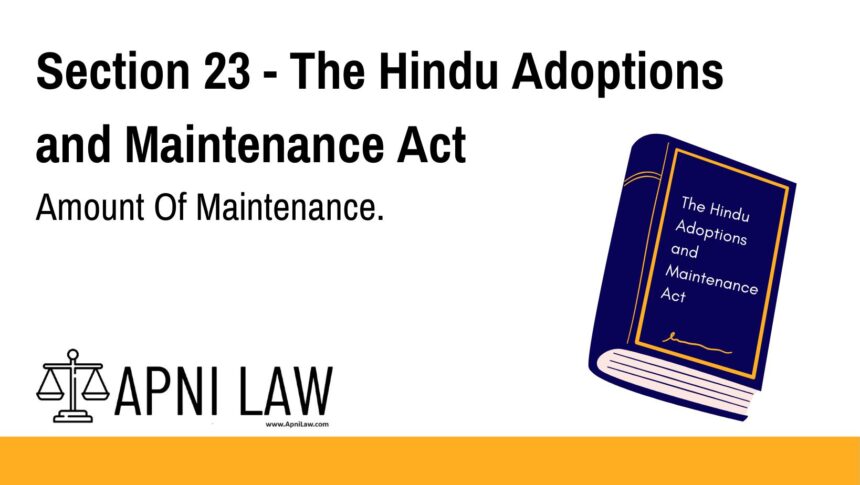Code: Section 23 – Amount of Maintenance
(1) It shall be in the discretion of the court to determine whether any, and if so what, maintenance shall be awarded under the provisions of this Act, and in doing so the court shall have due regard to the considerations set out in sub-section (2) or sub-section (3), as the case may be, so far as they are applicable.
(2) In determining the amount of maintenance, if any, to be awarded to a wife, children or aged or infirm parents under this Act, regard shall be had to—
(a) the position and status of the parties;
(b) the reasonable wants of the claimant;
(c) if the claimant is living separately, whether the claimant is justified in doing so;
(d) the value of the claimant’s property and any income derived from such property, or from the claimant’s own earnings or from any other source;
(e) the number of persons entitled to maintenance under this Act.
(3) In determining the amount of maintenance, if any, to be awarded to a dependant under this Act, regard shall be had to—
(a) the net value of the estate of the deceased after providing for the payment of his debts;
(b) the provision, if any, made under a will of the deceased in respect of the dependant;
(c) the degree of relationship between the two;
(d) the reasonable wants of the dependant;
(e) the past relations between the dependant and the deceased;
(f) the value of the property of the dependant and any income derived from such property; or from his or her earnings or from any other source;
(g) the number of dependants entitled to maintenance under this Act.
—
Explanation of Section 23
Section 23 of the Hindu Adoptions and Maintenance Act empowers the court to decide whether maintenance should be awarded under the Act and, if so, how much. The section lays out specific criteria for assessing the amount of maintenance, depending on whether the recipient is a wife, child, aged/infirm parent, or another dependant.
Key Principles:
- The decision lies at the discretion of the court.
- The court must consider multiple socio-economic and relational factors.
- Different criteria are used for wives, children, and parents (under sub-section 2) and other dependants (under sub-section 3).
This section is vital for ensuring fair maintenance judgments that reflect both the needs of the claimant and the financial ability of the person from whom maintenance is sought.
—
Illustration
Example 1: Maintenance for Wife
A woman separates from her husband and seeks maintenance. The court will assess her lifestyle, income, assets, and whether she is justified in living apart before awarding maintenance under Section 23(2).
Example 2: Maintenance for Dependant Sister
A man passes away leaving behind an unmarried sister dependent on him. The court will consider the net value of the deceased’s estate, their past relationship, the sister’s income/assets, and other dependants under Section 23(3).
—
Common Questions and Answers on Section 23
Q1. Who decides the amount of maintenance under this section?
A: The court has the discretion to decide whether maintenance is to be awarded and, if so, the appropriate amount.
Q2. What factors are considered for awarding maintenance to a wife or children?
A: The court looks at the status of the parties, reasonable needs, justification for separate living, and the income or property of the claimant.
Q3. Are dependants treated differently under this section?
A: Yes, a separate set of criteria under sub-section (3) applies to dependants such as siblings, in-laws, or others who were dependent on the deceased.
Q4. Can a wealthy dependant still claim maintenance?
A: If the dependant has sufficient income or assets, the court may reduce or deny maintenance based on that financial independence.
Q5. Can more than one person receive maintenance from the same estate?
A: Yes, but the number of eligible dependants is one of the key factors the court will weigh in determining the amount awarded to each.
—
Conclusion
Section 23 ensures that courts grant maintenance based on realistic and fair criteria, balancing the needs of the claimant and the financial situation of the person responsible for maintenance. It provides flexibility while safeguarding the rights of those entitled to support.
For expert legal advice on family maintenance rights, visit ApniLaw and connect with experienced professionals today.







